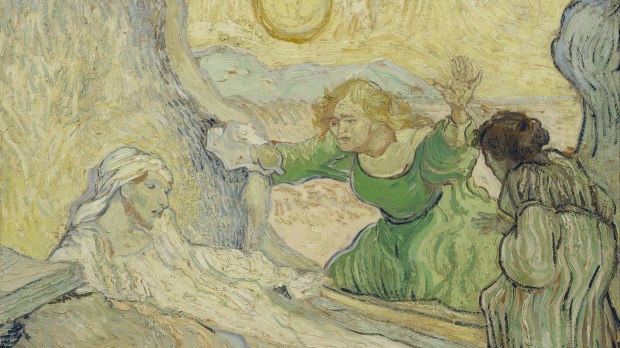My father took a big risk when I was 10 years old. I was deeply devoted to my godmother, my elderly grandaunt Aunt Sylvia. A few days before Christmas that year she died of a stroke, and I was devastated. My father fretted about whether or not to take me to the funeral home to view Aunt Sylvia’s body. He was afraid it might be too traumatic for me … that the shock of it might harm me. But in the end, he decided to take me, and thank God he did. My father realized it was important for me to go to the place of death and see the corpse of my godmother so that, through the experience, I could begin to understand that death is not the end but rather a beginning.
Something similar prompts Jesus at the death of his friend Lazarus. He says, Let us go to him…. Where have you laid him?… So Jesus, perturbed again, came to the tomb (Jn 11:1-45). Of course the big question is a somewhat defiant one: Could not [Jesus] have done something so that this man would not have died? The fact that Jesus deliberately did not prevent the death of his friend indicates how much we need to go through the experience of spiritual death in order to come to full life in Christ.
How to finish being born
Lazarus dead in the tomb for four days in many ways represents us and our condition. The difference is that we are the ones who put ourselves there as a result of our laxness, our inattention, our self-indulgence. Bishop Erik Varden describes spiritual death this way:
Spiritual death is the death we inflict on ourselves when we snuff out the divine light of grace by compromises with darkness. We confess and ask forgiveness for our half-heartedness, for our betrayals small and great. Grieving, we proclaim that our choices are not always right. We own our tendency to follow paths of self-destruction, prone as we are to be seduced by flighty pleasures, vain words, empty promises.
St. Gregory Palamas states: “Death, properly speaking, is this: for the soul to be unharnessed from divine grace to be yoked to sin.” Put simply, “death in the true sense is separation from God” (St. Maximus the Confessor). As such, death is the extinction of hope. “Death is absolute loneliness” (Ratzinger).
Yet, it is true to say that “on the day of my death I will finally finish being born” (Benjamin Franklin). In a beautiful meditation on death, Dominican Fr. Antonin Sertillanges (+1948) helps us understand how much we need to grapple with the phenomenon of death in order to advance in holiness. For the more we dare to reflect on the mystery of death, the more we discover truths which otherwise elude us:
In vain do we strive to put order into our destiny unless we learn from death to reach beyond earthly domains and find our highest treasure in that of which death can never despoil us. By the very fact of death the absurdity of life left to itself is self-evident. Let us not leave life to itself; let us reunite it to its Source.
Is there anything more shocking in the Gospel than that cadaver tied hand and foot with burial bands, his face wrapped in a cloth standing in the doorway of his grave? But we need to see it. For the sake of our own sanctification, we need to be close to it. Sertillanges says:
The proximity of death matures us and teaches us what living really is. What are you making of your life, he says to us with his silent look. You escape death in the exact degree that you give yourself to something greater than you are.
And so to enable us to give ourselves to something greater than we are, Jesus poses his next question.
What takes away the stone
Jesus turns to Martha and to us and asks: I am the resurrection and the life—do you believe this? What is Jesus’ purpose in soliciting our belief?
According to St. Thomas Aquinas, believing is not principally an inner conviction, and even less is it a feeling—believing really involves coming into contact with a truth. And that contact overturns death and revivifies life. “To become a believer means to escape our own gravity. Someone who believes has found in the truth the pearl for which he is ready to give everything, even himself” (Cardinal Ratzinger).
We come into contact with the Truth who is Jesus by courageously coming into contact first with whatever is dead and decaying in ourselves. But surely there will be a stench! It doesn’t matter. We put our trust in the mercy of the One who personally accompanies us to the place of death and there calls upon his Father’s love in prayer for our sake. United in that love, we are untied. We are let go and set free.
Jesus expressly asks us if we believe because “the act of saying ‘I believe’ is an act in which the will and the understanding, the teaching and the guidance I have been given, are all cooperatively involved. This act transcends my own limits. The words ‘I believe’ articulate a kind of certainty that is in many respects a higher degree of certainty than that of science” (Cardinal Ratzinger).
As we prepare for the death of Jesus on Good Friday, let us confide to him every trace of spiritual death that plagues us. We pray with the 14th-century Carthusian Ludolph of Saxony:
Most gentle Jesus, may you be moved to profound compassion for me in my misery as I endure the death that comes from delighting in, consenting to, and committing sin. I am buried beneath the crushing weight of habit. Raise me from the tomb of vice and enable me by confession to come forth.
~
Find Fr. Peter John Cameron’s reflection on the Sunday Gospel each week here.

